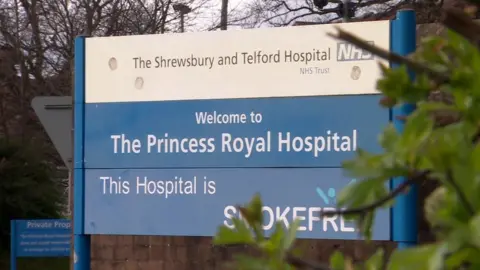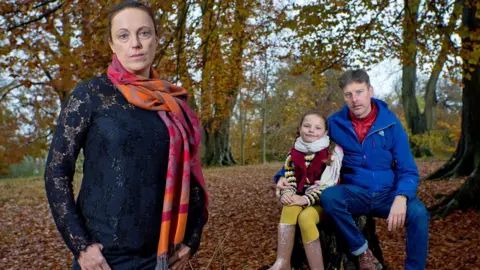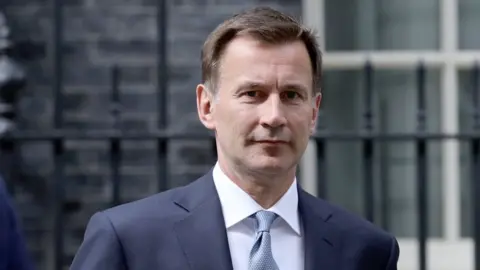Shropshire baby deaths: Trust will return £1m it received for 'good care'
 BBC
BBCAn NHS trust at the centre of an inquiry into preventable baby deaths will repay money it received for providing good maternity care.
In 2018, Shrewsbury and Telford NHS Trust received almost £1m, weeks before its services were rated inadequate.
The BBC revealed in December the trust had qualified for the payment under the NHS's Maternity Incentive Scheme.
The trust said an "incorrect submission" had been made and it had ordered an independent review.
Shrewsbury and Telford NHS Trust (SaTH) is at the centre of England's largest inquiry into poor maternity care, with more than 900 families contacting a review looking into concerns over preventable deaths and long-term harm.
 Richard Stanton
Richard StantonRhiannon Davies, whose daughter Kate died due to errors at the trust, said she was incredulous SaTH ever received the money.
"They have deceived, lied and through so doing, denied those deserving of the money from obtaining it.
"We know they haven't learned lessons from avoidable deaths. When will enough be enough?"
 PA Media
PA MediaFormer health secretary Jeremy Hunt wrote to ministers questioning if improvements to the Maternity Incentive Scheme were needed in light of payments made to both Shrewsbury and Telford and East Kent Hospitals, despite both facing serious questions over the safety of maternity services.
The trust in Shropshire was paid £963,391 after certifying it had met the 10 safety standards demanded by the scheme, which is run by NHS Resolution.
In the letter, seen by the BBC, Mr Hunt suggested one improvement would be to link payments to CQC maternity and safety ratings.
"The whole approach is likely to be discredited if trusts can meet all 10 actions and yet still be delivering poor standards of care," the letter said.

The Maternity Incentive Scheme
In 2018, NHS Resolution, the legal arm of NHS trusts in England, launched a scheme aimed at improving maternity care and reducing the cost of errors.
To qualify for payment, trusts had to certify they met 10 maternity safety standards. NHS Resolution did not ensure each trust met its requirements.
Of the 132 trusts that participated, 75 certified they had scored 10 out of 10 and became eligible to receive funding.

The money was paid to SaTH while Care Quality Commission (CQC) inspectors were assessing it. The CQC report rated the trust, including its maternity services, as inadequate.
Louise Barnett, chief executive of SaTH, said the trust had reassessed its submission to NHS Resolution and would be repaying the money.
"Although some good progress had been made, we did not have sufficient evidence to support the required 100% compliance in all of the standards," she said, adding that internal auditors "have been commissioned to undertake an independent review".
"We acknowledge that our systems need to be more robust. We are continuing to review and strengthen our governance processes, to provide additional rigour and scrutiny at all levels, which I welcome."
Currently, the CQC is carrying out a review at The Royal Shrewsbury Hospital and The Princess Royal Hospital in Telford, both of which are rated as inadequate - a rating the trust also shares.
A surprise inspection carried out in February found there was no children's nurse on duty at the Princess Royal Hospital's A&E department and sepsis screening and the use of antibiotics "required improvement".
There are currently 21 conditions imposed upon the trust by the CQC and the above issues are classed as breaches.
It will be discussed by the clinical commissioning group board when it meets on Tuesday.

Follow BBC West Midlands on Facebook, on Twitter, and sign up for local news updates direct to your phone.
